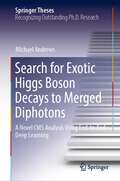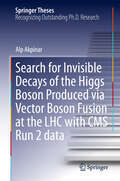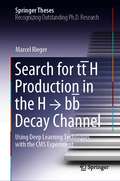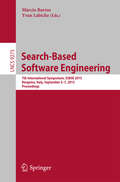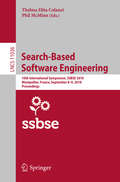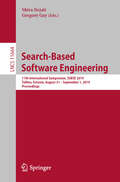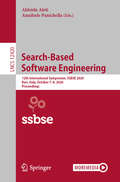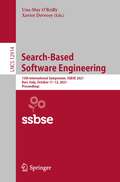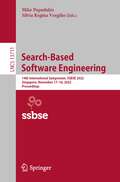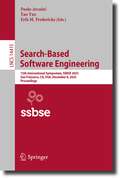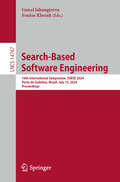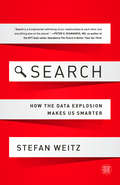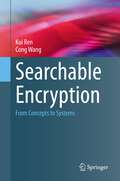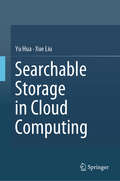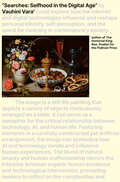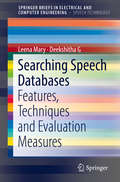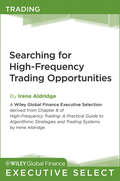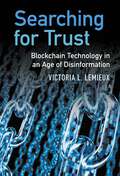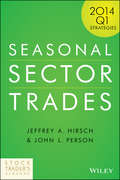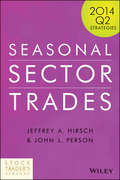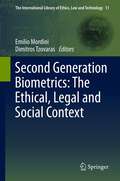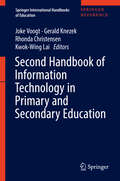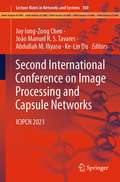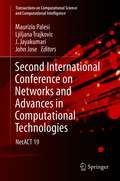- Table View
- List View
Search User Interfaces
by Marti A. HearstThe truly world-wide reach of the Web has brought with it a new realisation of the enormous importance of usability and user interface design. In the last ten years, much has become understood about what works in search interfaces from a usability perspective, and what does not. Researchers and practitioners have developed a wide range of innovative interface ideas, but only the most broadly acceptable make their way into major web search engines. This book summarizes these developments, presenting the state of the art of search interface design, both in academic research and in deployment in commercial systems. Many books describe the algorithms behind search engines and information retrieval systems, but the unique focus of this book is specifically on the user interface. It will be welcomed by industry professionals who design systems that use search interfaces as well as graduate students and academic researchers who investigate information systems.
Search for Exotic Higgs Boson Decays to Merged Diphotons: A Novel CMS Analysis Using End-to-End Deep Learning (Springer Theses)
by Michael AndrewsThis book describes the first application at CMS of deep learning algorithms trained directly on low-level, “raw” detector data, or so-called end-to-end physics reconstruction. Growing interest in searches for exotic new physics in the CMS collaboration at the Large Hadron Collider at CERN has highlighted the need for a new generation of particle reconstruction algorithms. For many exotic physics searches, sensitivity is constrained not by the ability to extract information from particle-level data but by inefficiencies in the reconstruction of the particle-level quantities themselves. The technique achieves a breakthrough in the reconstruction of highly merged photon pairs that are completely unresolved in the CMS detector. This newfound ability is used to perform the first direct search for exotic Higgs boson decays to a pair of hypothetical light scalar particles H→aa, each subsequently decaying to a pair of highly merged photons a→yy, an analysis once thought impossible to perform. The book concludes with an outlook on potential new exotic searches made accessible by this new reconstruction paradigm.
Search for Invisible Decays of the Higgs Boson Produced via Vector Boson Fusion at the LHC with CMS Run 2 data (Springer Theses)
by Alp AkpinarThis thesis reports the latest measurements on one of the leading dark matter searches conducted by the Compact Muon Solenoid (CMS) experiment at CERN, leading to some of the most stringent constraints on hypothesized interactions between the Higgs boson and dark matter. The thesis also includes further research about the future outlook of the experiment, including exploratory research on the adaptation of deep learning models in future dark matter analyses to improve analysis sensitivity, and the design of a new type of data processing hardware to be used in the next phase of the CMS experiment.
Search for tt̄H Production in the H → bb̅ Decay Channel: Using Deep Learning Techniques with the CMS Experiment (Springer Theses)
by Marcel RiegerIn 1964, a mechanism explaining the origin of particle masses was proposed by Robert Brout, François Englert, and Peter W. Higgs. 48 years later, in 2012, the so-called Higgs boson was discovered in proton-proton collisions recorded by experiments at the LHC. Since then, its ability to interact with quarks remained experimentally unconfirmed. This book presents a search for Higgs bosons produced in association with top quarks tt̄H in data recorded with the CMS detector in 2016. It focuses on Higgs boson decays into bottom quarks H → bb̅ and top quark pair decays involving at least one lepton. In this analysis, a multiclass classification approach using deep learning techniques was applied for the first time. In light of the dominant background contribution from tt̄ production, the developed method proved to achieve superior sensitivity with respect to existing techniques. In combination with searches in different decay channels, the presented work contributed to the first observations of tt̄H production and H → bb̅ decays.
Search-Based Software Engineering
by Márcio Barros Yvan LabicheThis book constitutes the refereed proceedings of the 7th International Symposium on Search-Based Software Engineering, SSBSE 2015, held in Bergamo, Italy, in September 2015. The 12 revised full papers presented together with 2 invited talks, 4 short papers, 2 papers of the graduate track, and 13 challenge track papers were carefully reviewed and selected from 51 submissions. Search Based Software Engineering (SBSE) studies the application of meta-heuristic optimization techniques to various software engineering problems, ranging from requirements engineering to software testing and maintenance.
Search-Based Software Engineering: 10th International Symposium, SSBSE 2018, Montpellier, France, September 8-9, 2018, Proceedings (Lecture Notes in Computer Science #11036)
by Thelma Elita Colanzi Phil McMinnThis book constitutes the refereed proceedings of the 10th International Symposium on Search-Based Software Engineering, SSBSE 2018, held in Montpellier, France, in September 2018. The 12 full papers and 7 short papers presented together with 3 keynotes, 2 tutorials, and 1 anniversary paper were carefully reviewed and selected from 21 submissions. SSBSE welcomes not only applications from throughout the software engineering lifecycle but also a broad range of search methods ranging from exact Operational Research techniques to nature-inspired algorithms and simulated annealing.Chapter "Deploying Search Based Software Engineering with Sapienz at Facebook" is available open access under a Creative Commons Attribution 4.0 International License via link.springer.com.
Search-Based Software Engineering: 11th International Symposium, SSBSE 2019, Tallinn, Estonia, August 31 – September 1, 2019, Proceedings (Lecture Notes in Computer Science #11664)
by Shiva Nejati Gregory GayThis book constitutes the refereed proceedings of the 11th International Symposium on Search-Based Software Engineering, SSBSE 2019, held in Tallinn, Estonia, in August/September 2019. The 9 research papers and 3 short papers presented together with 1 keynote and 1 challenge paper were carefully reviewed and selected from 28 submissions. SSBSE is a research area focused on the formulation of software engineering problems as search problems, and the subsequent use of complex heuristic techniques to attain optimal solutions to such problems. A wealth of engineering challenges - from test generation, to design refactoring, to process organization - can be solved efficiently through the application of automated optimization techniques. SBSE is a growing field - sitting at the crossroads between AI, machine learning, and software engineering - and SBSE techniques have begun to attain human-competitive results.
Search-Based Software Engineering: 12th International Symposium, SSBSE 2020, Bari, Italy, October 7–8, 2020, Proceedings (Lecture Notes in Computer Science #12420)
by Aldeida Aleti Annibale PanichellaThis book constitutes the refereed proceedings of the 12th International Symposium on Search-Based Software Engineering, SSBSE 2020, held in Bari, Italy, in October 2020. The 13 research papers and 5 short papers presented together with 1 keynote were carefully reviewed and selected from 34 submissions. SBSE is a research area focused on the formulation of software engineering problems as search problems, and the subsequent use of complex heuristic techniques to attain optimal solutions to such problems. A wealth of engineering challenges - from test generation, to design refactoring, to process organization - can be solved efficiently through the application of automated optimization techniques. SBSE is a growing field - sitting at the crossroads between AI, machine learning, and software engineering - and SBSE techniques have begun to attain human-competitive results. Due to the Corona pandemic SSBSE 2020 was held as a virtual event.
Search-Based Software Engineering: 13th International Symposium, SSBSE 2021, Bari, Italy, October 11–12, 2021, Proceedings (Lecture Notes in Computer Science #12914)
by Una-May O’Reilly Xavier DevroeyThis book constitutes the proceedings of the 13th International Symposium on Search-Based Software Engineering, SSBSE 2021, which was held in Bari, Italy, during October 11-12, 2021. The 9 full and 2 short papers included in this volume were carefully reviewed and selected from 19 submissions. The papers deal with novel ideas and applications of search-based software engineering, focusing on engineering challenges and the application of automated approaches and optimization techniques from AI and machine learning research.
Search-Based Software Engineering: 14th International Symposium, SSBSE 2022, Singapore, November 17–18, 2022, Proceedings (Lecture Notes in Computer Science #13711)
by Mike Papadakis Silvia Regina VergilioThis book constitutes the proceedings of the 14th International Symposium on Search-Based Software Engineering, SSBSE 2022, which was held in Singapore, in November 2022.The 6 regular papers, the NIER and RENE tracks as well as the Challenge Track that were included in this volume were carefully reviewed and selected from 15 submissions. The papers deal with novel ideas and applications of search-based software engineering, focusing on engineering challenges and the application of automated approaches and optimization techniques from AI and machine learning research.
Search-Based Software Engineering: 15th International Symposium, SSBSE 2023, San Francisco, CA, USA, December 8, 2023, Proceedings (Lecture Notes in Computer Science #14415)
by Tao Yue Paolo Arcaini Erik M. FredericksThis book constitutes the refereed proceedings of the 15th International Symposium on Search-Based Software Engineering, SSBSE 2023, which took place in San Francisco, CA, USA, during December 8, 2023.The 7 full and 7 short papers included in this book were carefully reviewed and selected from 23 submissions. They focus on formulating various optimization problems in software engineering as search problems, addressing them with search techniques, intending to automate complex software engineering tasks.
Search-Based Software Engineering: 16th International Symposium, SSBSE 2024, Porto de Galinhas, Brazil, July 15, 2024, Proceedings (Lecture Notes in Computer Science #14767)
by Foutse Khomh Gunel JahangirovaThis book constitutes the refereed proceedings of the 16th International Symposium on Search-Based Software Engineering, SSBSE 2024, held in Porto de Galinhas, Brazil, during July 2024. The 8 papers included in these proceedings were carefully reviewed and selected from 19 submissions. The papers deal with various aspects and applications of search-based software engineering, focusing on engineering challenges and the application of automated approaches and optimization techniques from AI and machine learning research.
Search: How the Data Explosion Makes Us Smarter
by Stefan WeitzSearch is as old as language. There has always been a need for one to find something in the jumble of human creation. The first web was nothing more than passing verbal histories down the generations so others could find and remember how not to get eaten; the first search used the power of written language to build simple indexes in printed books, leading to the Dewey Decimal system and reverse indices in more modern times. Then digital happened. Besides having profound societal impacts, it also made the act of searching almost impossibly complex for both engines and searchers. Information isn't just words; it is pictures, videos, thoughts tagged with geocode data, routes, physical world data, and, increasingly, the machines themselves reporting their condition and listening to others. Search: How the Data Explosion Makes Us Smarter holds up a mirror to our time to see if search can keep up. Author Stefan Weitz, Director of Search for Bing (Microsoft), explores the idea of access to help readers understand how we are inventing new ways to access data through devices in more places and with more capabilities. We are at the cusp of imbuing our generation with superpowers, but only if we fundamentally rethink what search is, how people can use it, and what we should demand of it.
Searchable Encryption: From Concepts to Systems (Wireless Networks)
by Cong Wang Kui RenThis book comprehensively reviews searchable encryption, which represents a series of research developments that directly enable search functionality over encrypted data. The book majorly covers: 1) the design and implementation of encrypted search algorithms, data structures, and systems that facilitate various forms of search over always-encrypted databases; 2) different threat models, assumptions, and the related security guarantees, when using searchable encryption in the real-world settings; and 3) latest efforts in building full-fledged encrypted database systems that draw insights from searchable encryption constructions.The book fits in the timely context, where the necessity of safeguarding important and sensitive data has been globally recognized. Traditional security measures, such as storing data behind network firewalls and layers of access control mechanisms to keep attackers out, are no longer sufficient to cope with the expanding landscape of surging cyber threats. There is an urgent call to keep sensitive data always encrypted to protect the data at rest, in transit, and in use. Doing so guarantees data confidentiality for owners, even if the data is out of their hands, e.g., hosted at in-the-cloud databases. The daunting challenge is how to perform computation over encrypted data. As we unfold in this book, searchable encryption, as a specific line of research in this broadly defined area, has received tremendous advancements over the past decades.This book is majorly oriented toward senior undergraduates, graduate students, and researchers, who want to work in the field and need extensive coverage of encrypted database research. It also targets security practitioners who want to make well-informed deployment choices of the latest advancements in searchable encryption for their targeted applications. Hopefully, this book will be beneficial in both regards.
Searchable Storage in Cloud Computing
by Yu Hua Xue LiuThis book presents the state-of-the-art work in terms of searchable storage in cloud computing. It introduces and presents new schemes for exploring and exploiting the searchable storage via cost-efficient semantic hashing computation. Specifically, the contents in this book include basic hashing structures (Bloom filters, locality sensitive hashing, cuckoo hashing), semantic storage systems, and searchable namespace, which support multiple applications, such as cloud backups, exact and approximate queries and image analytics. Readers would be interested in the searchable techniques due to the ease of use and simplicity. More importantly, all these mentioned structures and techniques have been really implemented to support real-world applications, some of which offer open-source codes for public use. Readers will obtain solid backgrounds, new insights and implementation experiences with basic knowledge in data structure and computer systems.
Searches: Selfhood in the Digital Age
by Vauhini VaraFrom the author of The Immortal King Rao, finalist for the Pulitzer Prize, a personal exploration of how technology companies have both fulfilled and exploited the human desire for understanding and connectionA MOST ANTICIPATED BOOK: The New York Times, Esquire, Harper&’s Bazaar, Foreign Policy, Bustle, Alta, Ms. Magazine, Cultured, Denizen, Lit Hub, Book Riot, and Electric LiteratureWhen it was released to the public in November 2022, ChatGPT awakened the world to a secretive project: teaching AI-powered machines to write. Its creators had a sweeping ambition—to build machines that could not only communicate, but could do all kinds of other activities, better than humans ever could. But was this goal actually achievable? And if reached, would it lead to our liberation or our subjugation? Vauhini Vara, an award-winning tech journalist and editor, had long been grappling with these questions. In 2021, she asked a predecessor of ChatGPT to write about her sister&’s death, resulting in an essay that was both more moving and more disturbing than she could have imagined. It quickly went viral.The experience, revealing both the power and the danger of corporate-owned technologies, forced Vara to interrogate how these technologies have influenced her understanding of her self and the world around her, from discovering online chat rooms as a preteen, to using social media as the Wall Street Journal&’s first Facebook reporter, to asking ChatGPT for writing advice—while compelling her to add to the trove of human-created material exploited for corporations&’ financial gain. Interspersed throughout this investigation are her own Google searches, Amazon reviews, and the other raw material of internet life—including the viral AI experiment that started it all. Searches illuminates how technological capitalism is both shaping and exploiting human existence, while proposing that by harnessing the collective creativity that makes humans unique, we might imagine a freer, more empowered relationship with our machines and, ultimately, with one another.
Searching Speech Databases: Features, Techniques and Evaluation Measures (SpringerBriefs in Speech Technology)
by Leena Mary Deekshitha GThis book presents techniques for audio search, aimed to retrieve information from massive speech databases by using audio query words. The authors examine different features, techniques and evaluation measures attempted by researchers around the world. The topics covered also include available databases, software / tools, patents / copyrights, and different platforms for benchmarking. The content is relevant for developers, academics, and students.
Searching for High-Frequency Trading Opportunities (Wiley Global Finance Executive Select #153)
by Irene AldridgePraise for High-Frequency Trading "A well thought out, practical guide covering all aspects of high-frequency trading and of systematic trading in general. I recommend this book highly." -Igor Tulchinsky, CEO, WorldQuant, LLC "For traditional fundamental and technical analysts, Irene Aldridge's book has the effect a first read of quantum physics would have had on traditional Newtonian physicists: eye-opening, challenging, and enlightening." -Neal M. Epstein, CFA, Managing Director, Research & Product Management, Proctor Investment Managers LLC Interest in high-frequency trading continues to grow, yet little has been published to help investors understand and implement high-frequency trading systems-until now. This book has everything you need to gain a firm grip on how high-frequency trading works and what it takes to apply this approach to your trading endeavors. Written by industry expert Irene Aldridge, High-Frequency Trading offers innovative insights into this dynamic discipline. Covering all aspects of high-frequency trading-from the formulation of ideas and the development of trading systems to application of capital and subsequent performance evaluation-this reliable resource will put you in a better position to excel in today's turbulent markets.
Searching for Trust: Blockchain Technology in an Age of Disinformation
by Victoria L. LemieuxSearching for Trust explores the intersection of trust, disinformation, and blockchain technology in an age of heightened institutional and epistemic mistrust. It adopts a unique archival theoretic lens to delve into how computational information processing has gradually supplanted traditional record keeping, putting at risk a centuries-old tradition of the 'moral defense of the record' and replacing it with a dominant ethos of information-processing efficiency. The author argues that focusing on information-processing efficiency over the defense of records against manipulation and corruption (the ancient task of the recordkeeper) has contributed to a diminution of the trustworthiness of information and a rise of disinformation, with attendant destabilization of the epistemic trust fabric of societies. Readers are asked to consider the potential and limitations of blockchains as the technological embodiment of the moral defense of the record and as means to restoring societal trust in an age of disinformation.
Seasonal Sector Trades: 2014 Q1 Strategies
by John L. Person Jeffrey A. HirschCommodity Trader's Almanac is now Seasonal Sector Trades! Strategies identifying the best-performing seasonal trades for the first quarter of 2014 Seasonal tendencies and cycles provide a foundation for profitable trading. This edition of Seasonal Sector Trades contains trade ideas and strategies for the first quarter (Q1) of 2014. It identifies the best trades for each month based on historic tendencies and cycles. A special report is issued covering stocks, bonds, currencies, energy, metals, grains, soft commodities, and meats. Concise and to-the-point, the report describes monthly price tendencies for each market, alerting you to major trading opportunities. An accompanying strategy calendar shows you what to monitor during the beginning, middle, and end of each month. In addition to this information, daily exits and entries are provided for trades with the best historic performance. Backstopping the trade ideas are articles on the major trades of the month and in-depth analysis on the historic price patterns of the underlying market. The trading ideas and data allow you to compare current market conditions against historic tendencies and make informed trading decisions along the way. Includes in-depth analysis and data of the seasonal tendencies of all major financial and commodity markets Details trading tips and strategies to maximize profits from suggested trades Based on years of proven historical data The culmination of years of painstaking research, this quarterly guide will provide you with the historic knowledge to spot big trades unfolding in today's markets.
Seasonal Sector Trades: 2014 Q2 Strategies
by John L. Person Jeffrey A. HirschCommodity Trader's Almanac is now Seasonal Sector Trades! A precise seasonal investment strategy, backed by research and hard data Seasonal Sector Trades: 2014 Q2 Strategies is a comprehensive strategy calendar detailing the trades to evaluate at key points in April, May, and June, based on historic tendencies and cycles. Concise and to the point, this report alerts readers to major trade opportunities by describing monthly price tendencies for each market, along with in-depth analysis of major trades and the underlying market conditions. The trading ideas are accompanied by data that allows for informed trading decisions, and precise dates are given for trades with the highest historic profitability percentages. Virtually every market displays seasonal tendencies due to weather, harvest cycles, or even human behavior. None of these patterns are 100 percent accurate, but they do provide a framework for assessing opportunity and targeting potential trades. The culmination of years of painstaking research, Seasonal Sector Trades offers expert guidance backed by hard data. Readers will gain insight and actionable advice on the best trades of the season, covering stocks, bonds, currencies, energy, metals, grains, soft commodities, and meats. This report contains crucial information traders need to take advantage of seasonal trends, including features like: Historical tendencies for all markets throughout the calendar year Trades to monitor throughout each month Precise entry and exits for trades with the best performance Trading tips and strategies to maximize profits A complete seasonal investment strategy can take years to research and compile. Markets must be monitored and analyzed, and their behavior must be correlated with outside factors. Along the way, opportunities are missed and money is lost. This report contains the results of all that work in an already-complete format. With high-level analysis and specialist insight, Seasonal Sector Trades is the industry's most authoritative guide to the seasonal tendencies of every major market.
Second Generation Biometrics: The Ethical, Legal and Social Context
by Dimitros Tzovaras Emilio MordiniWhile a sharp debate is emerging about whether conventional biometric technology offers society any significant advantages over other forms of identification, and whether it constitutes a threat to privacy, technology is rapidly progressing. Politicians and the public are still discussing fingerprinting and iris scan, while scientists and engineers are already testing futuristic solutions. Second generation biometrics - which include multimodal biometrics, behavioural biometrics, dynamic face recognition, EEG and ECG biometrics, remote iris recognition, and other, still more astonishing, applications - is a reality which promises to overturn any current ethical standard about human identification. Robots which recognise their masters, CCTV which detects intentions, voice responders which analyse emotions: these are only a few applications in progress to be developed. This book is the first ever published on ethical, social and privacy implications of second generation biometrics. Authors include both distinguished scientists in the biometric field and prominent ethical, privacy and social scholars. This makes this book an invaluable tool for policy makers, technologists, social scientists, privacy authorities involved in biometric policy setting. Moreover it is a precious instrument to update scholars from different disciplines who are interested in biometrics and its wider social, ethical and political implications.
Second Handbook of Information Technology in Primary and Secondary Education
by Joke Voogt Gerald Knezek Rhonda Christensen Kwok-Wing LaiIn this second edition the editors continue their efforts to synthesize research and practice and project future directions in the field of information and communication technology. The proliferation of mobile devices and applications have had major implications on how the nature of teaching and learning should be conceptualised, and what pedagogical practices should be used to support bridging formal and informal learning. The advent of social media also highlights the importance of gaining a deeper understanding of social learning theories and computer-supported collaborative learning theories and practices. The advancement of new technologies to support easy accessibility of educational resources such as OER and to a lesser extent MOOCs have led to the debate on how assessment should be conducted and how technologies could be used to support it. The demand of the knowledge society requires that researchers, policy makers, and educational practitioners be conversant with new research findings in order to understand the impact of ICT in teaching and learning, and how to support learners to use new technologies and applications creatively and effectively. New research paradigms have emerged to meet these challenges.
Second International Conference on Image Processing and Capsule Networks: ICIPCN 2021 (Lecture Notes in Networks and Systems #300)
by Ke-Lin Du João Manuel R. S. Tavares Joy Iong-Zong Chen Abdullah M. IliyasuThis book includes the papers presented in 2nd International Conference on Image Processing and Capsule Networks [ICIPCN 2021]. In this digital era, image processing plays a significant role in wide range of real-time applications like sensing, automation, health care, industries etc. Today, with many technological advances, many state-of-the-art techniques are integrated with image processing domain to enhance its adaptiveness, reliability, accuracy and efficiency. With the advent of intelligent technologies like machine learning especially deep learning, the imaging system can make decisions more and more accurately. Moreover, the application of deep learning will also help to identify the hidden information in volumetric images. Nevertheless, capsule network, a type of deep neural network, is revolutionizing the image processing domain; it is still in a research and development phase. In this perspective, this book includes the state-of-the-art research works that integrate intelligent techniques with image processing models, and also, it reports the recent advancements in image processing techniques. Also, this book includes the novel tools and techniques for deploying real-time image processing applications.The chapters will briefly discuss about the intelligent image processing technologies, which leverage an authoritative and detailed representation by delivering an enhanced image and video recognition and adaptive processing mechanisms, which may clearly define the image and the family of image processing techniques and applications that are closely related to the humanistic way of thinking.
Second International Conference on Networks and Advances in Computational Technologies: NetACT 19 (Transactions on Computational Science and Computational Intelligence)
by Maurizio Palesi Ljiljana Trajkovic J. Jayakumari John JoseThis book presents the proceedings of the 2nd International Conference on Networks and Advances in Computational Technologies (NetACT19) which took place on July 23-25, 2019 at Mar Baselios College of Engineering and Technology in Thiruvananthapuram, India. The conference was in association with Bowie State University, USA, Gannon University, USA and Malardalen University, Sweden. Papers presented were included in technical programs that were part of five parallel tracks, namely Computer Application, Image Processing, Network Security, Hardware & Network Systems and Machine Learning. The proceedings brings together experts from industry, governments and academia from around the world with vast experiences in design, engineering and research.Presents the proceedings of the 2nd International Conference on Networks and Advances in Computational Technologies (NetACT19);Includes research in Computer Application, Image Processing, Network Security, Hardware & Network Systems and Machine Learning;Provides perspectives from industry, academia and government.

